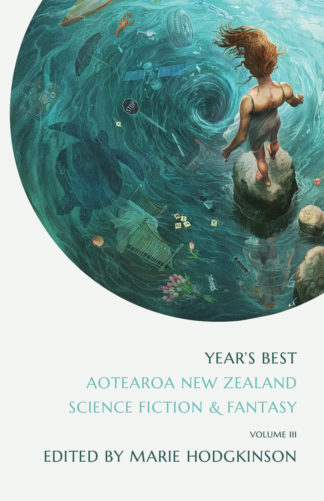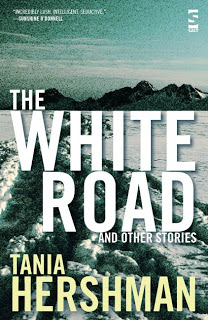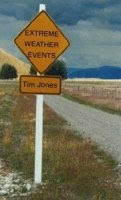This story of love and literary funding appears in Transported.
Sheree and Miranda met at a party. Each left with the other on her mind.
Several weeks later, the Mexican Ambassador, a keen patron of the arts, held a reception. Miranda, ranked as a Tier Two poet for funding purposes, saw Sheree across the room. Miranda made a beeline for her – only to realise that Sheree was with a group of Tier Ones. Embarrassed, Miranda backed away.
That would have been that; but, a little to the north and far beneath their feet, Gaia shifted in her sleep. Poets and patrons alike rushed for doorways and crush-proof spaces. Sheree and Miranda found themselves pressed together against an antimacassar. Their mutual awkwardness was obliterated by fear. “You’re beautiful,” said Sheree. Miranda, plain and tall, was swept away.
Heads were counted once the tremor passed and the tumult subsided. Miranda and Sheree were missing. Separately, from Sheree’s bed, they phoned in their excuses.
Miranda went home. “I haven’t seen you for days,” her flatmate remarked. It wasn’t much of a flat, not really, and the flatmate held the lease.
“You can move in with me,” said Sheree.
Having lugged the last of her boxes up Sheree’s steps, Miranda went out on the deck. The harbour view, which she had admired since the first night she spent there, now felt like hers. The weather was grey and cold. Far below, hardy ants, gloved and muffled, scurried to and fro on the beach.
Between Miranda’s job and Sheree’s funding, they had enough to pay the rent, and a little left over. They each had time to write. Sheree wrote in the morning, after Miranda had left for work, and spent the afternoon completing grant applications and working on a project to deliver sonnets by mobile phone. Some platform-specific issues were still to be resolved.
Miranda wrote on Saturday afternoons, while Sheree played hockey.
They had other interests in common. They both collected earthenware. They both loved tramping. In summer, they joined a party heading south to Nelson Lakes. They were the only writers. It was bliss.
They dealt with literary functions by arriving separately and avoiding each other, though they exchanged sly glances when they thought no one was looking.
It worked for a while. But, inevitably, word got around. A small independent publisher agreed to bring out Miranda’s first collection. “I want to be with you at the launch,” said Sheree. “I’m not going to pretend.”
The publisher had hired a church hall. A few bankable names came along. When Miranda read, Sheree stood in the front row. When Miranda signed, Sheree sat next to her. “You must be so proud of her,” someone told Sheree.
Sheree’s third collection was launched at Unity. Sheree dragged Miranda along. That didn’t go so well. Miranda hung back, feeling like a fraud. Sheree talked with her friends and cast irritated glances Miranda’s way.
Miranda retreated to the outer shelves, looking at a bound edition of Ursula Bethell. Blanche Baughan was reassuringly close at hand.
Sheree forgave her. They forgave each other. They got drunk. They compared royalty statements. “It’s more about grants and residencies,” explained Sheree.
In the autumn, Miranda was up for reclassification. Without the support of a university press, Miranda had no realistic hope of moving up to Tier One, but she was still disappointed when the envelope came.
“Never mind,” said Sheree. “I love you anyway.”
Sheree’s status was secure for two more years.
Miranda came home from work a few weeks later to find Sheree bouncing off the walls. “Look at this!” she said.
It was an invitation from the Northern festival circuit: Nuuk and Norilsk, Vorkuta, Longyearbyen. Four weeks north of the Arctic Circle, reading, writing, workshopping. And watching out for polar bears – they could kill you. “I’m to be preceded by a man with a rifle,” said Sheree.
New Zealand literature had never before been represented so far north. It was a feather in everyone’s cap.
“I’ll miss you so much,” said Miranda. She clung to Sheree, tenderly, fiercely.
Sheree bought Miranda a video-enabled phone before she left. Four weeks of Sheree – blond hair poking out of her fur-lined hood – cavorting with new friends, silhouetted against snow, standing next to oil drums full of burning blubber to keep warm.
Nuuk, the capital of Greenland, was surprisingly cosmopolitan. Norilsk was one giant chemical dump. In Vorkuta, Sheree won the V. I. Morozov Prize for Best Recital of an Individual Work, for her declamatory piece in the style of Gregory Corso. The prize, thanks to a well-connected local businessman, was paid in US dollars. With the news, Sheree sent an air ticket. “I’m stopping over in the Caribbean on the way home to thaw out,” said Sheree. “See you in Basseterre!”
It took some nerve to ask, but Miranda’s boss was understanding. “I wish I could go with you,” Miranda’s boss said, and Miranda realised, suddenly, that she meant it.
Basseterre! Miranda had never heard of it. Palms shaded the beach, the locals talked about cricket, and once they had circumnavigated the island of St Kitts, there was nothing to do but eat, drink, sleep, and make love. Sheree kept Miranda entertained with tales from the frozen North. Longyearbyen had been the wildest of the lot. “Those Norwegians!” said Sheree. They were crazy up there. So were the bears.
They came home to the wind and the rain. Sheree set to work completing her fourth collection and editing podcasts from the festivals. She had secured funding for a G5 workstation, her latest pride and joy. Miranda had three poems published in Takahe and two more accepted by JAAM. She read at the Angus Inn. It was a wet night in the Hutt Valley, and some of the locals stayed away. Her collection, which was now heavily discounted, sold three copies. Not bad, considering. She was given a voucher for petrol, though she had conscientiously taken the train.
Sheree’s poem about their week together in the Caribbean is justly famous and much-anthologised.
Miranda’s boss gave her a promotion. Miranda and Sheree joined a soccer team. Sheree was the centre-forward. Miranda was a holding midfielder.
Delivering sonnets by mobile phone had not been a complete success, but the project hit the jackpot with haiku. Haiku were back, said Sheree.
People grow and change. It’s nothing to be ashamed of. A new funding category, Tier Four, was introduced. In consequence, Tier Two poets became eligible to be mentors, and Miranda took on a mentee. She was young, tiny, a wounded bird. Her name was Caroline. She lived in Johnsonville.
Nothing might have come of it, had Sheree’s success at Vorkuta not been noticed in high places. It took a public-private partnership, with a mixture of tagged funding, corporate sponsorship in three bands, and matching Government contributions, but at last the deal could be announced. Sheree would be New Zealand’s first poet in space! She would carry leading New Zealand brands to low earth orbit, and return with a three-book deal.
It was on for young and old. Sheree became public property, meeting the Prime Minister, appearing on Takatapui and Kiwifruit. In months, in weeks, in days, she was off to Star City to train for her mission.
“I love you,” she told Miranda, from the airport, from Moscow, from Star City. Photos: Sheree in a centrifuge, her compact body whirling round. Sheree hanging weightless in the hydrolab. The two cosmonauts who would be flying her to the International Space Station, Valentina and Vsevolod. Their brave little Soyuz spacecraft. I love you, Miranda, said Sheree.
Miranda’s mentee was promising but needy. Miranda allowed herself to engage in conduct that was inappropriate to the mentor-mentee relationship and breached the terms of her contract with the funding agency. She reproached herself late at night, as she watched Caroline sleeping.
Sheree appeared on BBC World, CNN, and Al Arabiya.
Miranda kept writing. A second published collection would be something. Not everyone made it that far.
Live streaming video of the launch, with Russian-language commentary, was available. Using high-speed broadband on Sheree’s G5, Miranda was able to hear the countdown, see the rocket on the launch pad, watch it vault upwards into space.
Sheree made contact. Docking had been successful, and she was aboard the space station. Three months to do nothing but write, and sleep, and float. (And help around the place; tidiness was especially important in space.) Every 92 minutes, she would pass overhead.
The mentoring period finished. Caroline could now be revealed as Miranda’s girlfriend. She had dependency issues, but that meant she was usually home.
Miranda broke the news to Sheree by scheduled uplink. Sheree did not respond immediately. One orbit passed, two. Then Sheree said she was sad, but not surprised. Also, two nights ago, she and Valentina …
Miranda had three poems published in Bravado. Sport and Landfall regretted to inform. Trout did not reply.
As a result of Miranda’s excellent mentoring, Caroline was reclassified to Tier Three. She sold a poem to North & South. You’re going places, girl, thought Miranda.
Caroline had an empty room and a double bed. Miranda decided she was going places too. She moved her boxes out of Sheree’s house, down the steps, and off to Johnsonville. She promised Sheree that she’d continue to water her plants. Sheree had already asked Miranda and Caroline to come for dinner the first weekend after she got home from Russia. I want to be your best friend, said Sheree.
When the last lot of boxes was safely in Caroline’s van, Miranda returned to stand on the balcony for one last look across the harbour. Oh, she would miss the view! On the promenade below, hardy ants rode skateboards, walked dogs, and ate products containing dairy, gluten, and traces of nuts.
Above, the stars shone steadily. Among them was Sheree. Miranda could see her clearly. She was looking out of a porthole, smiling fondly down.





